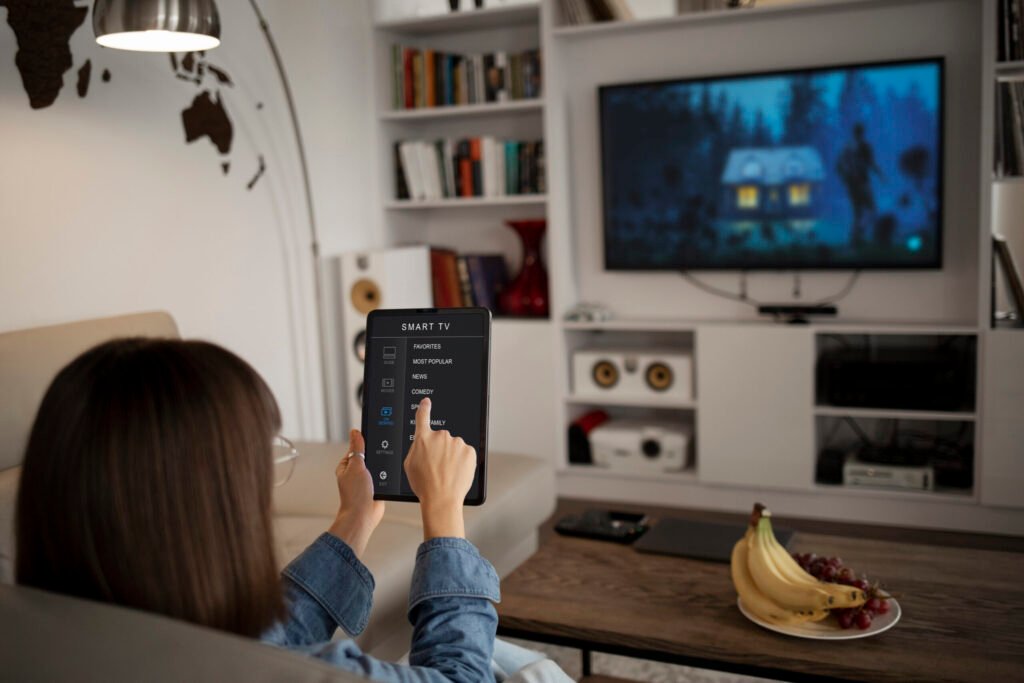Smart TVs are designed to connect to the internet, making them ideal for IPTV (Internet Protocol Television) subscriptions. IPTV services deliver live TV channels, video ondemand VODand time-shifted content over the internet, bypassing traditional cable or satellite services.
How Smart TVs Support IPTV:
Smart TVs are equipped with built-in apps and internet connectivity, allowing users to install and stream IPTV services without additional hardware. Here’s how they work.
Setting Up IPTV on a Smart TV Stepby Step Guide:
Connect the Smart TV to Wi-Fi or Ethernet. Step :Install an IPTV player from the Smart TV app store. Step Open the IPTV app and enter subscription details (M3U playlist, Xtream Codes, or MAC address) Step Load the IPTV playlist and browse available channel Step Start streaming your favorite live TV, movies, or sports.
What is IPTV?
IPTV stands for Internet Protocol Television. It refers to television content that is delivered over an Internet Protocol (IP) network, rather than through traditional satellite or cable television formats. It can deliver both live and on-demand content. IPTV allows users to stream different types of media content, such as live TV channels, movies, and videos. The only thing they require is an active Internet connection.

How is IPTV different from Traditional TV?
To understand how IPTV is different from traditional TV, let’s compare the traditional mode of viewing TV with IPTV.
How Does IPTV Work?
IPTV is much more similar to browsing the internet than traditional channel surfing. It merely uses IP (Internet Protocol), a transport protocol that is a delivery mechanism to deliver the videos to the viewer.When the viewer clicks on any TV program or requests the video, video from different sources (servers) is divided into data packets and sent over the internet. Video servers transmit programs through fiber-optic cable to existing households via an internet connection and requests are sent out and shows are sent back.
IPTV Architecture:
Depending on the network architecture of the service provider, there are two main types of IPTV architecture that can be considered for IPTV deployment: centralized and distributed.The centralized architecture model is a relatively simple and easy-to-manage solution. Because all media content is stored on centralized servers, it does not require a comprehensive content distribution system.Centralized architecture is generally good for a network that provides relatively small VOD service deployment, has an adequate core and edge bandwidth, and has an efficient content delivery network (CDN).

Architecture Diagram of a Typical IPTV Network:
Network IPTV Architecture DiagramBroadcast content from Satellites and Local Antennas is received by the central unit. The central unit is where live TV channels and AV sources are encoded, encrypted, and delivered in the form of IP multicast streams.The Central unit will also contain the Advertising Servers, Live TV Streaming Servers, Video on Demand (VOD) servers & platform, and is where on-demand video assets are stored and served as IP unicast streams when a user makes a request. The VOD platform may sometimes be located with and considered part of, the IPTV’s central unit.
How Does IPTV Work From the Viewer’s End?
When the viewer subscribes to a particular IPTV service they are provided with the service’s specific Set Top Box (STB).A set-top box is a piece of endpoint equipment that decodes and decrypts TV and VOD streams for display on the TV screen. This STB is connected to the viewers’ internet connection (router) and uses the internet to deliver the video and TV content to the viewer.
What is an IPTV Box?
An IPTV Box is a type of set-top box that can convert internet protocol signals into a format that can be read and interpreted by your TV. It is important because your TV does not have any built-in system to interpret the signals received via the Internet. Thus, these IPTV Boxes play a crucial role in this process, as they act as a bridge between your TV and the internet.
What is IPTV? How IPTV Works? Best IPTV Devices, Services, and more:
Are you eager to know what is IPTV? In this blog, we will take a closer look at what is IPTV, what is IPTV box, how it works & its architecture. We will also discuss the best IPTV devices, the types of IPTV services, the future of IPTV solutions, and everything else you need to know about IPTV.When we talk about online streaming, there are many terms we come across, IPTV being one of them. The world is seeing a paradigm shift from traditional modes of broadcasting like cable and satellite TV to internet-based streaming. And IPTV as a system plays a major role in this transition.
Best IPTV Devices:
So, now you must be wondering, which will be the best IPTV Box (or IPTV device) for you, right? In today’s scenario, many companies have come up with quality IPTV boxes and devices, so it is really difficult to choose.

What Are The Pros and Cons of IPTV?
Every system has its pros and cons, and IPTV is not an exception. It has a lot of benefits for the users, let’s take a look at some of them first.
Pros of IPTV:
IPTV viewers can experience much more flexible TV viewing, as they can pause, rewind, and fast-forward the content at their own will. As most of the IPTV boxes support HD and 4K streaming, you will get much-improved picture quality, as compared to the traditional TV. Some of the IPTV boxes offer channels and apps specific to different niches. Hence, you can stream different types of content, and enjoy more content options.
Market Size and Future of IPTV:
IPTV has been on a continuous growth path in the last few years. The global IPTV market, which stood at US$ 50.9 billion in 2021, is expected to reach US$ 115.2 billion in 2026. Hence, the market size of IPTV will grow at a CAGR of 17.8% during this time.
Is IPTV Subscription Legal in the US?
IPTV Subscription, and IPTV service in general, is legal as long as the IPTV service provider has the license to stream the content that it intends to show. We know that every content has a copyright license. And if the IPTV service provider streams the shows without due permission from the copyright owners, then it will be definitely illegal.
Wrapping Up:
We hope we have helped you to understand What is IPTV and how it works? And if you are intending to start your own streaming service, then we have got the perfect solution for you.
